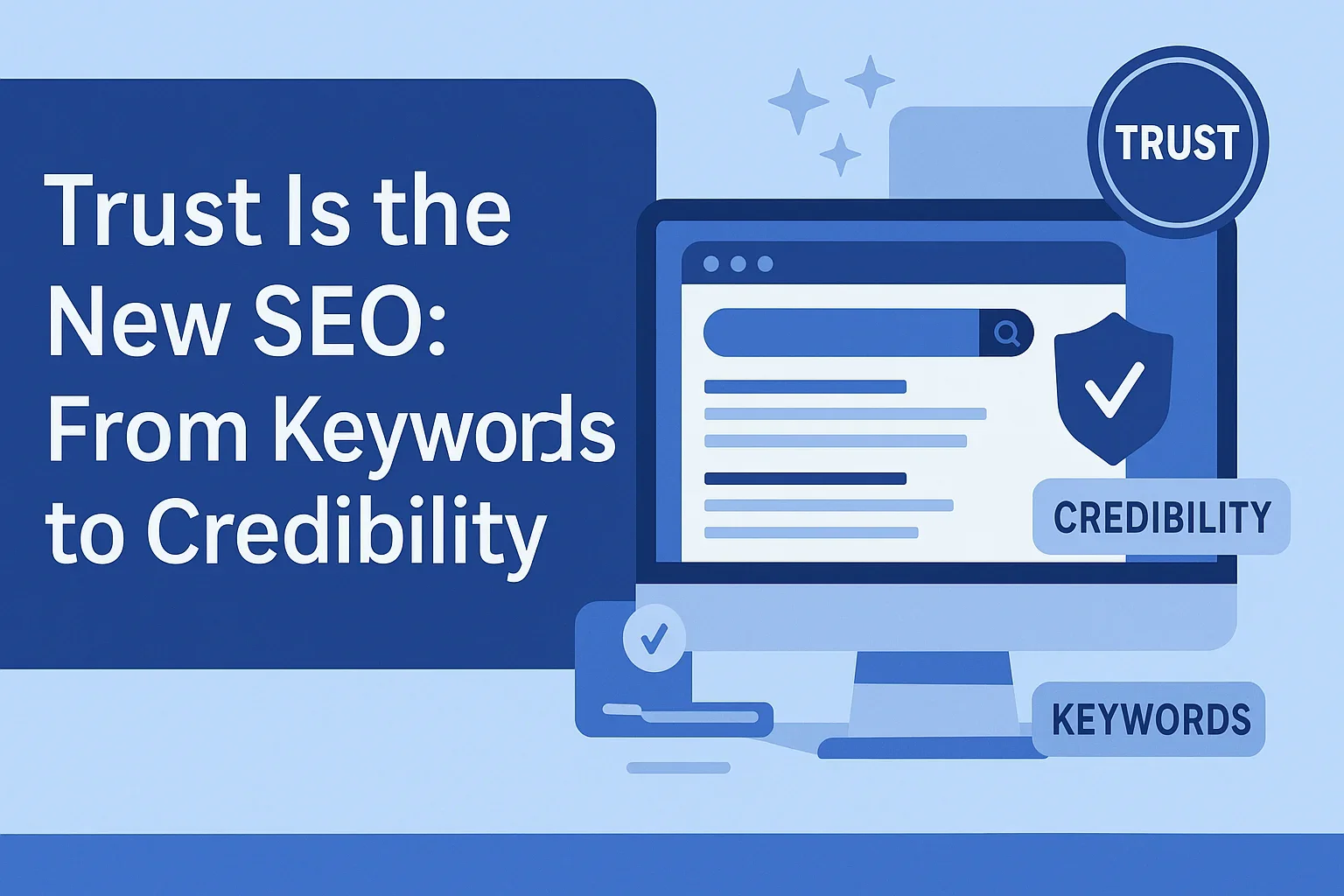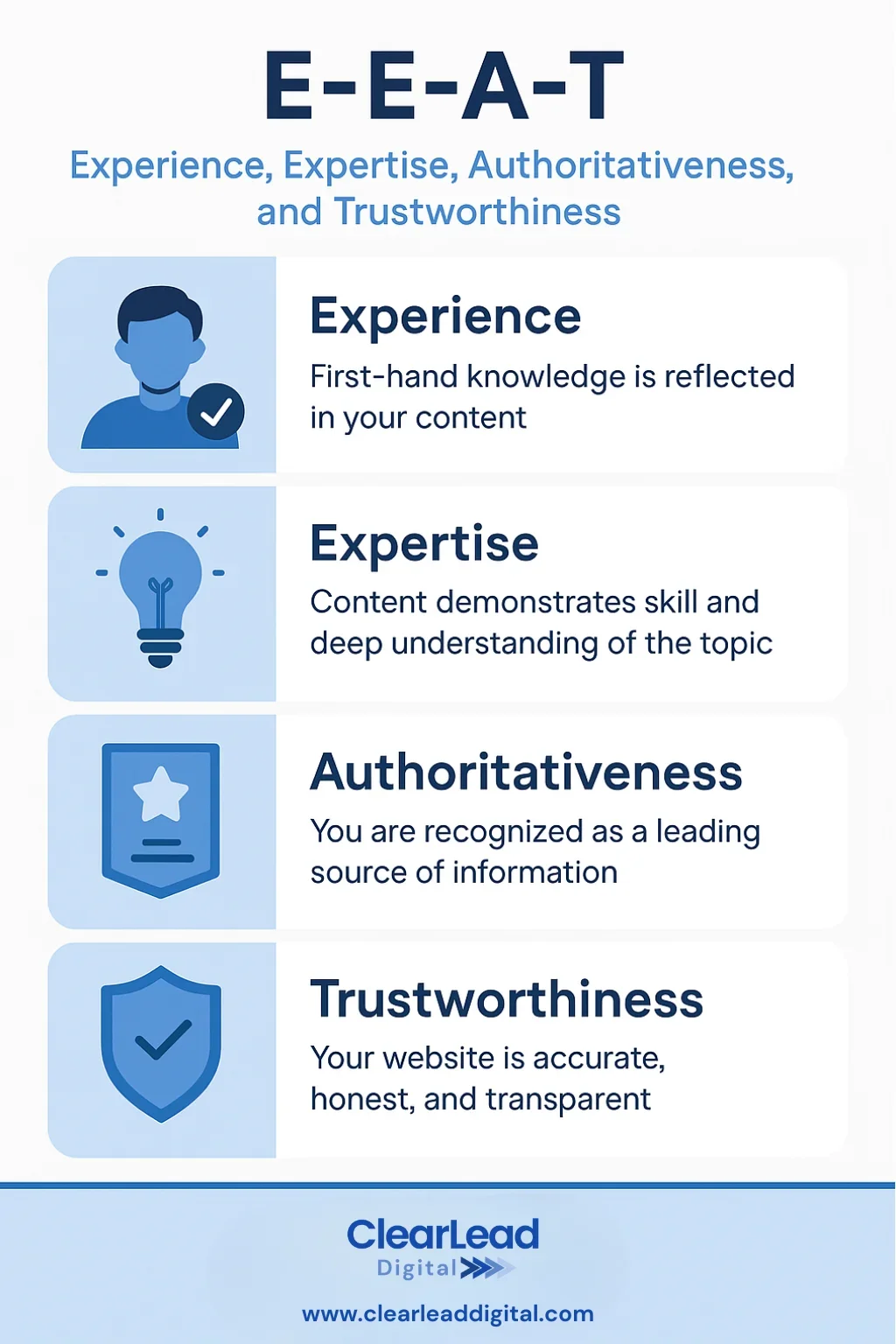Trust Is the New SEO: From Keywords to Credibility
Last Updated: August 2, 2025
Table of Contents
You’re Already Being Ranked
You didn’t ask to be ranked. But you are.
Every time someone types your business name into Google…
Every time a potential client checks reviews before calling you…
Every time AI answers, “Who’s the best [insert service] near me?”
You’re showing up in a digital comparison—whether you want to or not.
And the number one thing being evaluated isn’t your price, product, or pitch.
It’s trust.
In 2025, trust has quietly become the most important ranking factor in SEO. Not because Google said so in a press release—but because the internet is evolving. Fast.
Here’s what that means for your business—and what you need to do about it.
What “Trust” Actually Means to Google
Let’s start with the basics.
In recent years, Google has leaned into something called E-E-A-T: Experience, Expertise, Authoritativeness, and Trustworthiness.
This framework helps Google decide what content deserves to show up at the top of search results. But here’s the key—trust is no longer just one factor among many. It’s the foundation.
If Google doesn’t trust your content, your expertise and authority don’t matter. It doesn’t matter how many blog posts you’ve published or how long you’ve been in business. If the algorithm picks up even small signs that your business might be risky, outdated, or misleading—you’re filtered out.
Why This Shift Happened
Think about how people search today.
They Google your business before they call.
They read reviews before they believe your claims.
They trust search summaries—often written by AI—more than your homepage.
And now, with AI-powered results from Google’s SGE (Search Generative Experience), your website might not even be the first thing they see. Instead, they get a summary that combines information from multiple sources.
That means your entire digital presence—from your site, to your reviews, to your mentions in the news—feeds into how people (and search engines) trust you.
You don’t control when this happens. But you do control what they find.
You’re in a Race You Didn’t Enter
Even if you’re not actively doing SEO, you’re being ranked and compared.
A competitor with more 5-star reviews looks safer.
A business that updates their blog regularly looks more current.
A company with consistent branding across platforms looks more legit.
People trust what’s visible. And search engines do, too.
So the question isn’t “Should I invest in SEO?”
The question is “What happens if I don’t manage how I’m being perceived online?”
What Google’s Algorithm Looks for in 2025
Here are the trust-based signals that actually move the needle today:
1. Real-World Experience (the new E in E-E-A-T)
Share stories from the field. Use photos that weren’t taken from stock libraries. Write in a way that only someone doing the work every day could write. Google wants to show content written by real people with real experience.
2. Reputation Signals
Your online reviews, third-party ratings, testimonials, and mentions on other sites tell Google whether you’re respected—or ignored. This includes:
Google Business Profile reviews
Yelp, Trustpilot, and industry-specific directories
Social media engagement
News coverage or podcasts you’ve appeared on
3. Consistency Across Platforms
Is your name, address, phone number, and business description the same everywhere? Discrepancies confuse algorithms and damage trust.
4. Updated, Helpful Content
Google favors sites that actively maintain their information. A blog post from 2018 about a fast-changing topic isn’t just irrelevant—it looks careless. So do outdated service pages, broken links, and missing contact info.
5. Technical Trust Factors
It’s not just about content. Technical SEO plays a role too:
HTTPS encryption
Mobile-friendliness
Fast loading times
Clear navigation
No sketchy redirects or pop-ups
These are things that say, “This site is legit.”
How to Build Trust Into Your SEO (Without Sounding Like a Robot)
This isn’t about sounding perfect. It’s about sounding real.
Here’s how to show up in a way that builds trust—and rankings:
✅ Claim Your Google Business Profile
Keep it updated with photos, service info, and accurate hours. Respond to reviews. Add FAQs and posts.
✅ Collect Real Reviews
Don’t buy fake ones. Instead, ask real customers to leave honest feedback. You don’t need a perfect 5.0—just a steady stream of solid reviews with thoughtful comments.
✅ Write Content That Reflects Your Experience
Skip the fluff. Answer questions you hear from real customers. Share your process. Show what makes you different—and back it up.
✅ Make Your “About” Page Human
Show your face. Tell your story. Include bios, credentials, and even behind-the-scenes photos if you have them.
✅ Clean Up Your Listings
Use a tool like Yext or manually check directories to make sure your business info is the same everywhere. Inconsistencies = red flags to search engines.
✅ Stay Active
Even posting a new blog once a month signals that your business is alive and paying attention. It’s better to post slowly and consistently than to blast content and disappear.
Final Thought: Trust Is Earned—Then Ranked
Google doesn’t trust websites. It trusts people. But the only way Google knows who to trust is by watching what real people say and do online.
Your job isn’t to “do SEO” the old way. It’s to show up the way you do in real life: honest, reliable, helpful, and clear.
Trust is what people remember.
And now, it’s what search engines reward.
Need help building an SEO strategy that actually builds trust?
Let’s dig into your content, clean up your reputation, and make your site something Google wants to show. Apply for your Free SEO Audit from ClearLead Digital today.
Frequently Asked Questions
-
You can build trust with Google by:
Earning positive, authentic reviews
Creating helpful, experience-based content
Keeping your contact info and business details consistent across platforms
Having a secure (HTTPS) and mobile-friendly website
Avoiding thin content, misleading claims, or shady backlink tactics
-
E-E-A-T stands for Experience, Expertise, Authoritativeness, and Trustworthiness. It’s how Google evaluates whether content should rank. In 2025, trust is considered the most important part of that equation. Even if your content is expert-level, it won’t rank well without clear trust signals.
-
Reviews—especially on Google Business Profile—affect both local SEO and how trustworthy your brand appears online. More (and better) reviews help you rank higher in local results and increase click-through rates. Google also uses review content to understand what you do and how well you serve your customers.
-
Not really. Even if you don’t optimize every technical detail, trust-based SEO still requires effort. That includes managing your online reputation, creating relevant content, and keeping your web presence up to date. Trust doesn’t replace SEO—it reshapes it.
-
AI tools (like Google’s SGE or ChatGPT search plugins) now summarize and rank businesses based on trust signals pulled from across the web. If your business isn’t seen as credible, you may get skipped in summaries—even if you rank well in regular search results.


